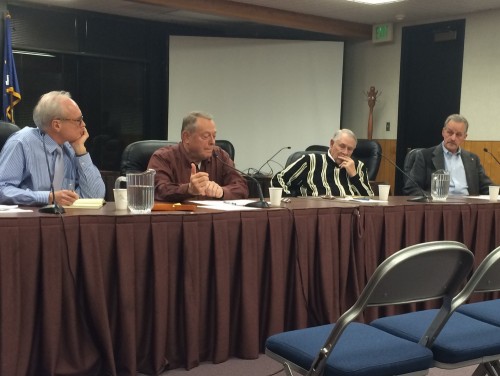
Sitka City Administrators past and present discuss the city’s challenges at a live town hall meeting. From left to right: Mark Gorman, John Stein, Gary Paxton and Hugh Bevan. (KCAW photo/Rachel Waldholz)
It was billed as a chance to hash out some big, serious issues. How can the city balance a growing demand for services with flat or declining revenue? Should we raise taxes? Cut services? Grow the economy? And how?
Last week (Thu 2-27-2014), Sitka’s current City Administrator, Mark Gorman, invited three of his predecessors – Gary Paxton, Hugh Bevan, and John Stein – to join him for a live, public town hall meeting before an audience of about 35 residents, to discuss how to tackle some of the major challenges ahead for the city. The event was broadcast live on Raven Radio.
But the night started out on a simpler note:
“I was going to say, everybody raise your hand who doesn’t recycle, but don’t do that,” said Paxton, who was city administrator for nine years, 1992 to 2001. “But listen, If you don’t recycle, dang it, recycle!”
It might seem like a small issue, but Paxton argued that engaging citizens, in ways both large and small, has always been the key to meeting Sitka’s challenges.
When the city clearly explains a need, he said, residents rise to the occasion.
“The good news is that our citizens, in my view, have always come to the needs of the city government in our town, when the need is there,” Paxton said.
For instance, he said, when the pulp mill closed during his tenure, residents voted to increase the sales tax from four to five percent to keep the city budget afloat.
The panel split over the question of deferred maintenance, the amount the city has to pay to keep up basic infrastructure. Gorman said the city will need $97-million dollars to cover deferred maintenance over the next 20 years.
“We all talk about well maybe it’s time to let our roads go back to gravel,” he said. “We’re not even putting enough aside to take care of gravel roads.”
But Hugh Bevan, who served as city administrator from 2003 to 2005, said the situation is not nearly so dire.
“I think we need to keep one foot on the ground with this whole deferred maintenance thing,” Bevan said. “I’ve been fortunate to live in a lot of little towns in Alaska in the last forty years, and Sitka is in really great shape….You’re building an $11-million addition to this building, a brand new library, we just paid cash for a fire station, putting brand new roofs on everything…I think we’ve sort of spooked ourselves with this whole deferred maintenance [concern].”
Bevan said that one way to address road repairs is through public-private partnerships, in which local neighborhoods band together to pitch in 25% of the cost of their local street work.
John Stein, who served as administrator from 2005 to 2008, said Sitka has seen that process work before.
“That’s how Sitka’s roads were built,” Stein said. “A third was the city, a third was one side of the street, a third was the other side of the street, and we used state money, so a lot of that 1970 construction was shared costs.”
Stein also pointed out that Sitka has enjoyed about forty years of low property taxes, and maybe that era has to come to an end.
Resident Anne Pollnow proposed a different option, instead: rescinding the senior sales tax exemption.
“I know it’s never popular,” Pollnow said. “It’s been proposed at assembly meetings and it always gets shot down, and I feel very brave right now, coming forward with that, but I am, because I am having a really hard time.”
Many in the audience agreed with Pollnow. Others said that seniors living on fixed incomes are already stretched too thin, and getting rid of the exemption could drive them out of town.
One thing everyone agreed upon was the need for more affordable housing. Sitka resident Eric Jordan said the city’s biggest asset is its beautiful location and vibrant community — but that many people who would otherwise flock to Sitka are locked out by the price of homes.
“Fishermen from around this region – I know several including my own son – they would love to live here, if they could afford it,” Jordan said.
Current city administrator Mark Gorman said he recognized the importance of talking about some of these issues informally, before the assembly begins its annual — and often stressful — budget process. He referred to his three predecessors as an important asset for the community, and said that he personally had learned a lot.
And also, he said, to laughter, “Dang it. Recycle. It makes you feel good.”






























